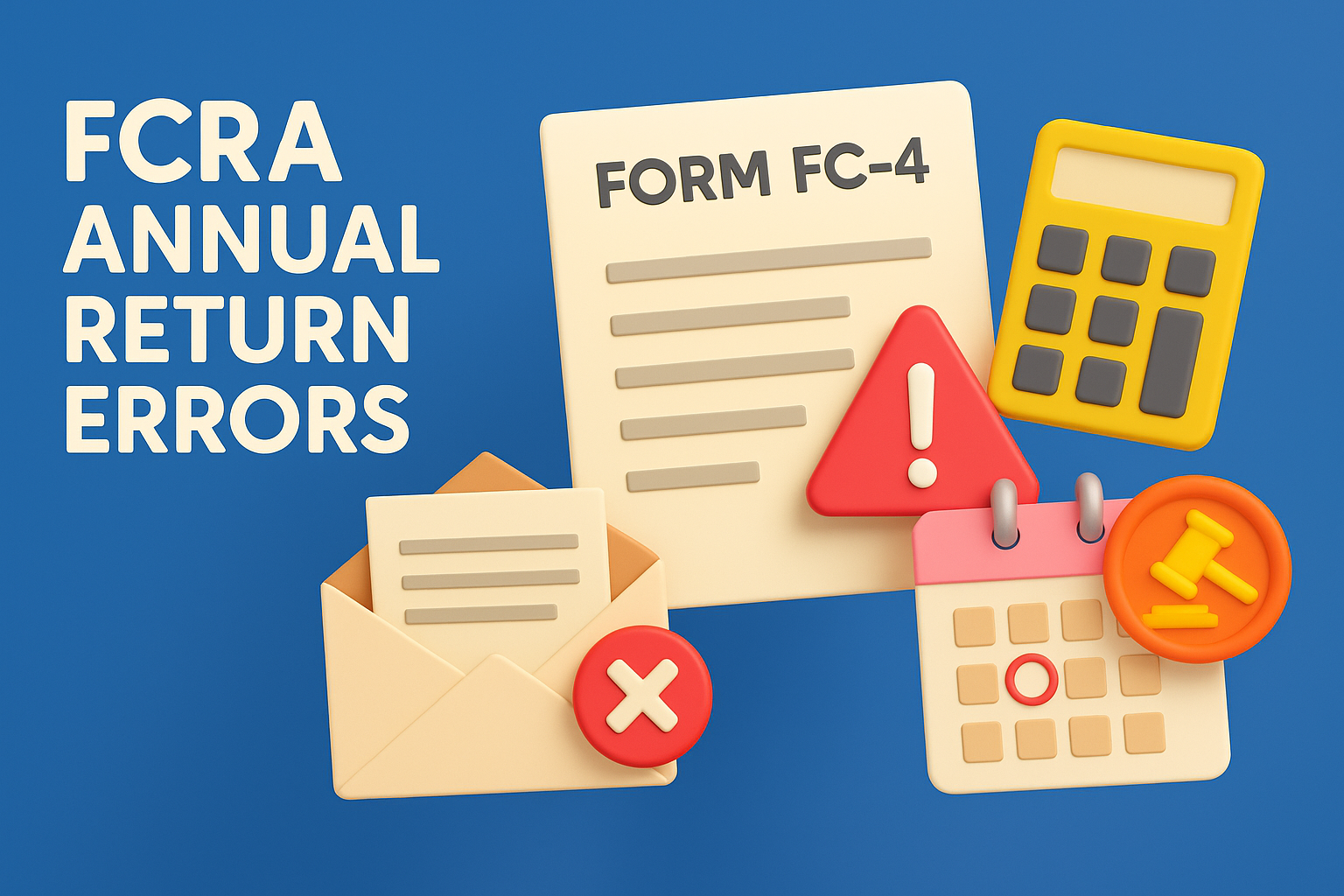
FCRA Annual Return Errors Leading to Penalties or Suspension
NGOs registered under FCRA are required to file annual returns under Section 18, detailing the receipt and utilization of foreign contributions. Errors in these returns can lead to penalties under Section 19 or suspension / cancellation under Section 14.
Legal Provisions and Bare Act Analysis
Section 18 mandates that NGOs file FormFC-4 annually, providing details of foreign contributions received, their sources, and their utilization. Rule 17 of the FCRR specifies that returns must be filed by December 31 of the following financial year, accompanied by audited financial statements. Section 13 allows the MHA to suspend registration for up to 180 days for non-compliance, while Section 14 permits cancellation for serious violations.
Common errors include:
Judicial Interpretations and Case Law
In National Youth Project v. Union of India (2020), the Supreme Court upheld the suspension of an NGO’s FCRA registration due to late filing of Form FC-4 for two consecutive years. The court emphasized that timely and accurate reporting is non-negotiable under FCRA.
In Greenpeace India v. Union of India (2016), the Delhi High Court addressed discrepancies in financial reporting, where the NGO failed to account for certain foreign contributions. The court ruled that even unintentional errors could lead to penalties if they indicated a lack of due diligence.
Practical Implications and Examples
Consider an NGO, “Health for All,” which receives $50,000 from a foreign donor. If it fails to report the exact amount in Form FC-4 or misclassifies it as a domestic contribution, the MHA may impose a penalty of up to 10% of the contribution under Section 19. In 2020, an NGO in Karnataka faced a ₹5 lakh penalty for under-reporting foreign contributions by ₹50 lakh due to clerical errors.
Another example is late submission. An NGO in Uttar Pradesh had its registration suspended in 2021 for filing Form FC-4 in March instead of December, causing a six-month disruption in its operations.
Advantages of Compliance
Accurate and timely filing of FCRA returns:
Professional Advice
To avoid errors, NGOs should:
Additional Points: Recent Developments and Case Studies
The FCRA Amendment Act,2020 ,introducedstricterreportingrequirements, in cluding quarterly disclosures of contributions exceeding ₹20,000. NGOs must now upload Form FC-4 on the MHA’s online portal, increasing transparency but also the risk of errors if data is not meticulously verified. A 2023 case study of an NGO in Delhi revealed that it avoided penalties by implementing a dedicated FCRA compliance team, which cross-checked all financial data before submission.
How to File ITR-7: A Step-by-Step Guide Who Must File. ITR-7 is the Income-tax return f...
Form 10BD and 80G Compliance Legal Framework Section 80G(5)(viii) of the Income Tax A...
Latest Rules for Renewal of 12AB & 80G Registrations Under current tax law, registe...
PUBLIC INSTITUTIONS EXEMPT FROM TAX [SECTION 10] The Income Tax Act of India, under S...
Donations from Non-Resident Indians (NRIs) and Overseas Citizens of India (OCIs) Overvi...
FCRA Renewal Process: Timeline, Documents, and Grounds for Rejection Overview The FCR...
Private trusts serve as powerful tools for asset management and wealth preservation, but understan...
What is Form 10BB and How to File It – Audit Report for Charitable Institutions ...
Can NGOs Accept Donations from Foreign Companies Without Indian Presence? Overview Th...
How to Form a Section 8 Company: Procedure, Benefits & Pitfalls A Section 8 Company (Compa...